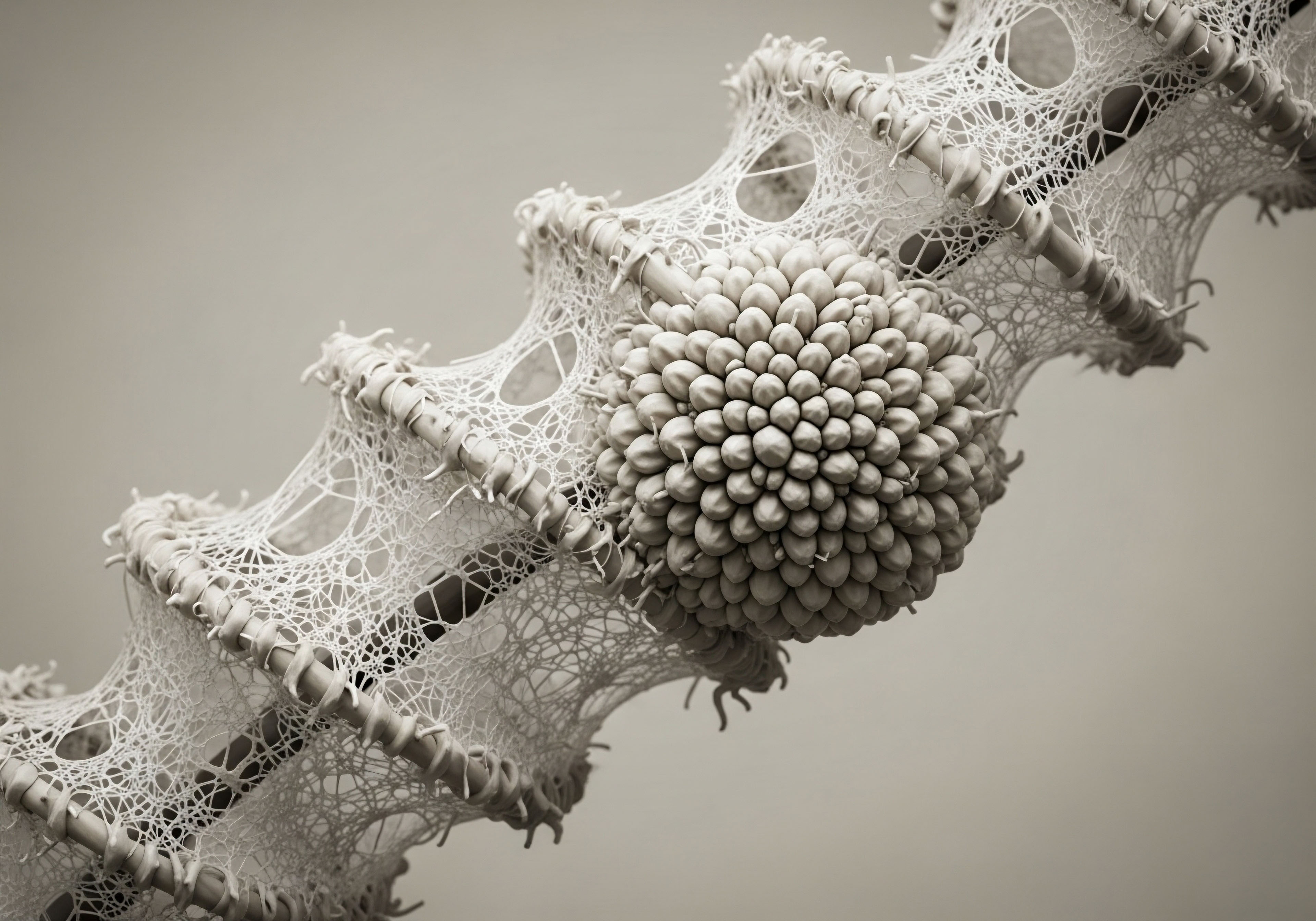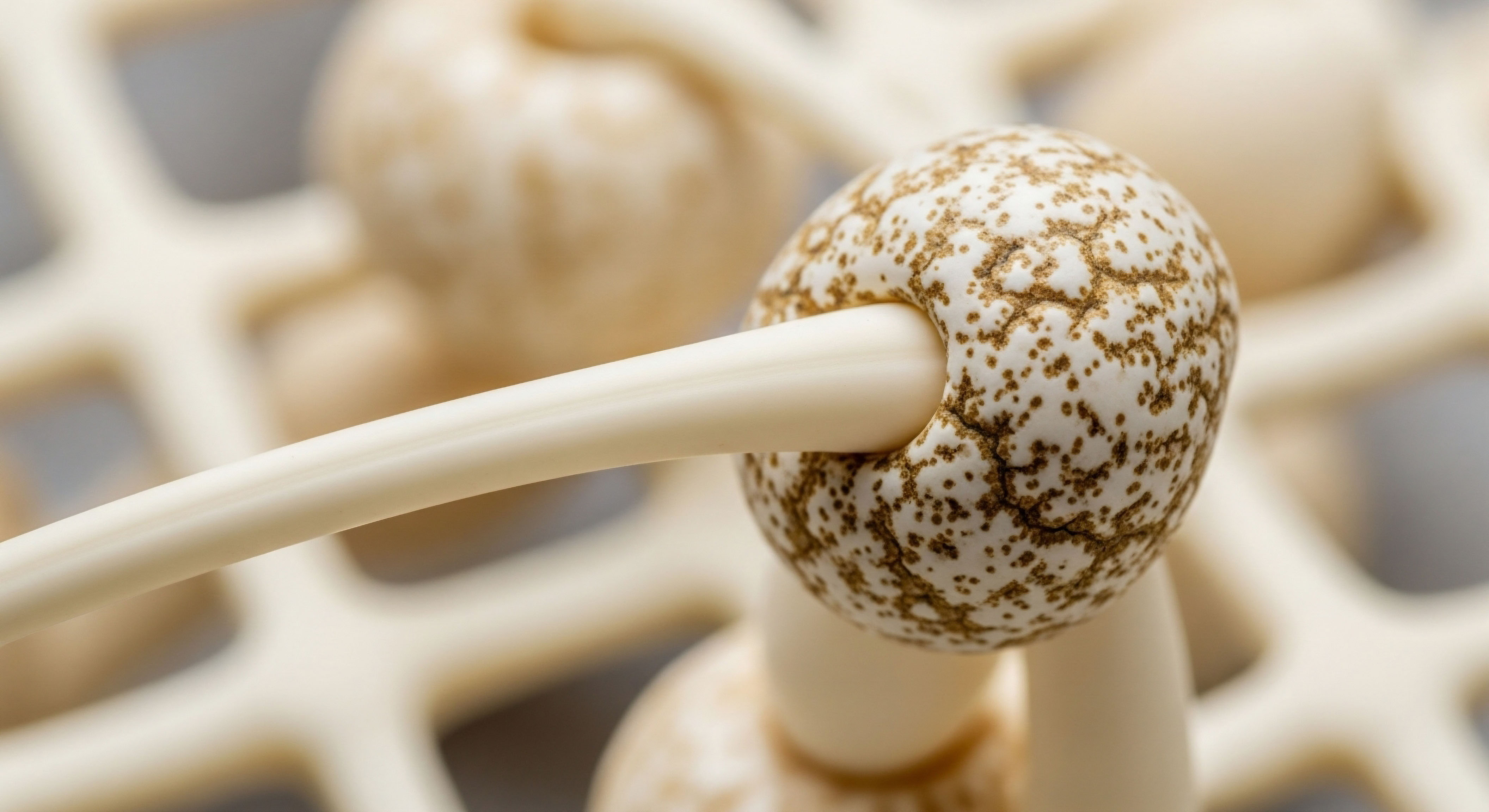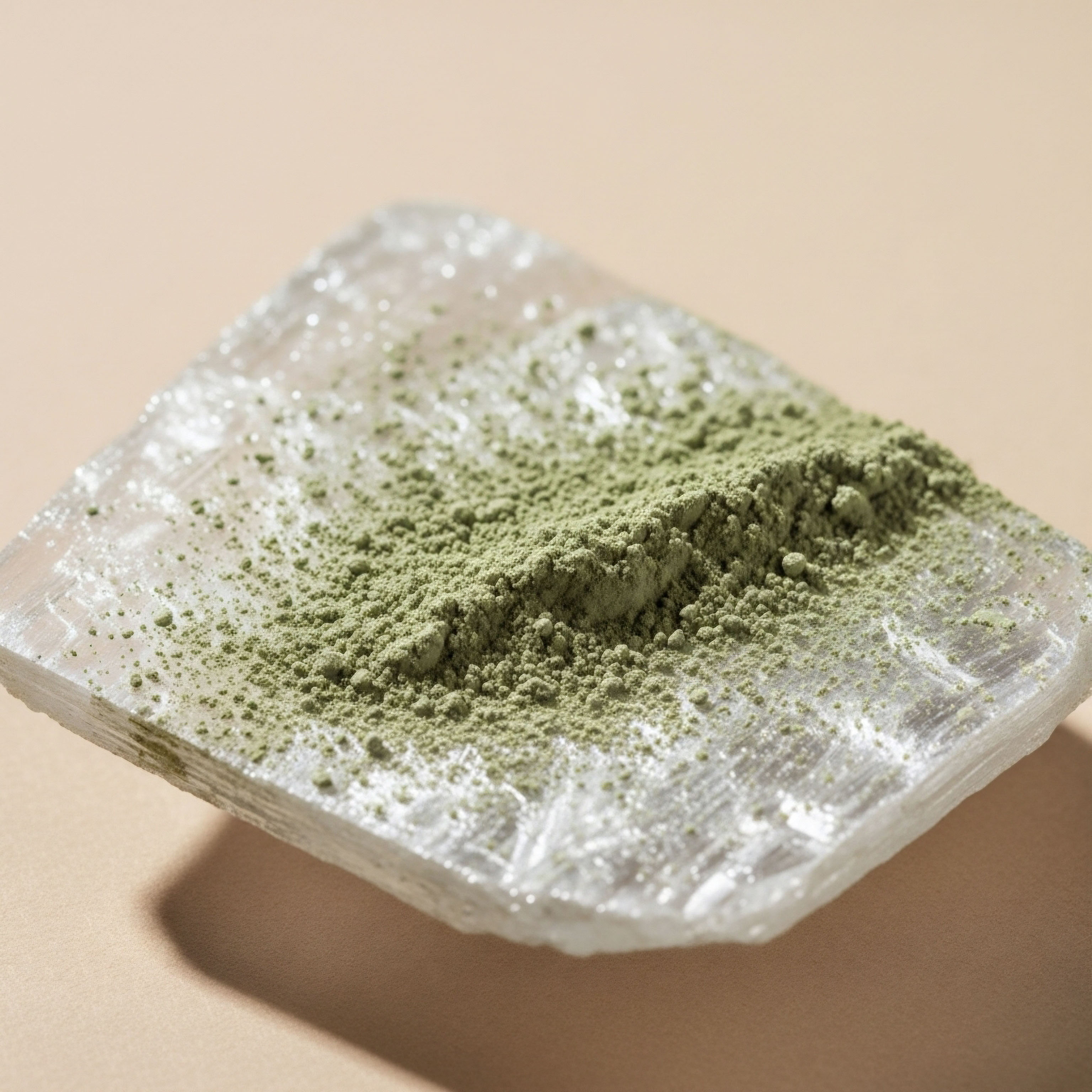

Fundamentals
You may have noticed a shift in your cognitive world. The clarity that once defined your thoughts might now seem intermittent, replaced by a subtle but persistent mental fog. Words can feel just out of reach, and the multitasking you once handled with ease now feels draining.
This experience, this subjective change in your mental acuity, is real and deeply personal. It is a valid biological signal from your body, an indication that the intricate communication network within your brain is undergoing a transformation. At the center of this network are hormones, the body’s primary chemical messengers. They are the conductors of your physiological orchestra, and their influence extends profoundly into the realm of cognitive function.
Understanding the connection between your hormones and your brain is the first step toward reclaiming your mental sharpness. The brain is a profoundly responsive endocrine organ, rich with receptors for hormones like testosterone, estrogen, and progesterone. These molecules are not merely involved in reproduction and physical characteristics; they are fundamental to brain health.
They act as powerful modulators of neuronal function, influencing everything from the energy supply of brain cells to the very structure of neural connections. When hormonal levels decline or become imbalanced with age, the impact is felt directly in the command center of your body, manifesting as the cognitive symptoms you may be experiencing.

The Brain’s Hormonal Architecture
Your brain’s ability to think, learn, and remember is dependent on a dynamic process called synaptic plasticity, which is the capacity of synapses, the connections between neurons, to strengthen or weaken over time. This process is the cellular basis of learning and memory.
Steroid hormones, particularly estrogens and androgens like testosterone, are critical regulators of this plasticity. They influence the density of dendritic spines, the tiny protrusions on neurons that receive signals, effectively changing the brain’s wiring in response to experience.
Consider the hippocampus, a brain region vital for memory formation. It is densely populated with estrogen and testosterone receptors. When these hormone levels are optimal, they promote the health and growth of neurons in this area. They also support the production of key neurotransmitters, the chemical signals that neurons use to communicate.
Serotonin, dopamine, and acetylcholine are all modulated by hormonal status, and their balance is directly tied to mood, motivation, and memory recall. A decline in hormonal support can lead to a less efficient, less plastic, and more vulnerable neural environment.

Hormones as Neuroprotective Agents
Beyond enhancing day-to-day cognitive processes, hormones serve a vital protective function in the brain. They are powerful neuroprotective agents, helping to defend neurons against damage from stress, inflammation, and the natural aging process. Estrogen, for example, has been shown to have antioxidant properties and to support cerebral blood flow, ensuring that brain cells receive the oxygen and nutrients they need to thrive.
Testosterone also contributes to this protective shield, with studies suggesting it helps preserve brain tissue volume and maintain the integrity of myelin, the protective sheath that insulates nerve fibers and ensures rapid communication between brain regions.
The experience of “brain fog” during andropause or menopause is a direct reflection of this diminished protection and regulation. The decline in hormonal signaling can lead to a state of increased neuroinflammation and reduced cellular energy. This creates a biological backdrop where cognitive tasks require more effort and the brain’s resilience is lowered.
Recognizing this connection is empowering. It reframes your symptoms from a personal failing into a physiological reality, one that can be understood and addressed through a systematic and evidence-based approach to restoring hormonal balance.
Your personal experience of cognitive change is a direct reflection of the shifting hormonal landscape within your brain.
This foundational understanding shifts the conversation. The goal of hormone optimization is to restore the biochemical environment in which your brain is designed to flourish. It involves re-establishing the signaling pathways that support synaptic plasticity, neurotransmitter balance, and the brain’s innate protective mechanisms. By addressing the root physiological drivers of cognitive symptoms, you can begin a journey toward not just feeling better, but thinking more clearly and preserving your cognitive vitality for the long term.


Intermediate
Moving from the foundational knowledge of hormones’ role in the brain to the practical application of optimization protocols requires a deeper look at the mechanisms involved. When we discuss hormone optimization, we are referring to a set of precise clinical strategies designed to restore hormonal concentrations to a range associated with youthful vitality and optimal function.
These protocols are not a one-size-fits-all solution but are tailored based on an individual’s symptoms, laboratory results, and specific health goals. The primary objective is to re-establish the physiological signaling that supports robust cognitive performance, addressing issues like memory, focus, and mental processing speed at their biological source.
The endocrine system operates on a series of sophisticated feedback loops, with the Hypothalamic-Pituitary-Gonadal (HPG) axis serving as the central command for sex hormone production. In men, the hypothalamus releases Gonadotropin-Releasing Hormone (GnRH), which signals the pituitary to release Luteinizing Hormone (LH) and Follicle-Stimulating Hormone (FSH).
LH then stimulates the testes to produce testosterone. In women, this same axis governs the cyclical production of estrogen and progesterone. Age-related decline in gonadal function disrupts this entire axis, leading to the hormonal deficiencies that impact cognitive health. Optimization protocols are designed to intelligently intervene in this system to restore its equilibrium.

Protocols for Male Cognitive Vitality
For men experiencing the cognitive and physical symptoms of andropause, Testosterone Replacement Therapy (TRT) is a cornerstone protocol. The goal is to restore serum testosterone to the upper end of the normal range for a young, healthy adult. This biochemical recalibration has direct implications for the brain.
- Testosterone Cypionate ∞ Administered typically via weekly intramuscular or subcutaneous injections, this bioidentical form of testosterone directly replenishes declining levels. In the brain, testosterone enhances dopamine release, which is linked to motivation, focus, and executive function. It also has been shown to increase brain-derived neurotrophic factor (BDNF), a protein that promotes the survival, growth, and differentiation of new neurons and synapses.
- Gonadorelin ∞ This peptide is a GnRH analogue. Its inclusion in a TRT protocol is vital for maintaining the integrity of the HPG axis. By providing a stimulus that mimics the body’s natural signal, Gonadorelin helps prevent testicular atrophy and preserves endogenous testosterone production capacity. This systemic approach ensures the entire hormonal axis remains functional, which is important for long-term physiological balance.
- Anastrozole ∞ Testosterone can be converted into estrogen via an enzyme called aromatase. While some estrogen is necessary for male health, excess levels can lead to side effects and may counteract some of the cognitive benefits of TRT. Anastrozole is an aromatase inhibitor used judiciously to maintain an optimal testosterone-to-estrogen ratio, ensuring that the cognitive benefits of testosterone are maximized without the confounding effects of hormonal imbalance.
Studies have shown that men on TRT, particularly those who present with mild cognitive impairment at baseline, may experience significant improvements in cognitive domains. The combination of restoring testosterone and maintaining the function of the HPG axis creates a powerful intervention for supporting long-term brain health.

Hormonal Support for the Female Brain
For women navigating perimenopause and post-menopause, hormonal fluctuations and decline present a distinct set of challenges to cognitive function. The precipitous drop in estrogen and progesterone can disrupt the delicate neurochemical balance that supports memory and mood. Tailored hormone therapy aims to buffer the brain from these changes.
What Are The Long-Term Cognitive Safety Implications Of Menopausal Hormone Therapy?
Long-term follow-up studies, such as the KEEPS Continuation Study, provide reassurance regarding the neurocognitive safety of menopausal hormone therapy (mHT) when initiated in early menopause for symptom management. The data suggests that for healthy women, mHT does not appear to cause long-term cognitive harm, nor does it confer significant protective benefits against cognitive decline.
The timing of initiation appears to be a key factor, with evidence supporting a “critical window” near the onset of menopause for neutral or potentially positive outcomes.
Restoring hormonal balance through targeted protocols is a direct intervention to support the brain’s communication and energy systems.
The protocols for women are nuanced and highly individualized:
- Estradiol ∞ Administered transdermally (via patch) or orally, bioidentical estradiol replacement is foundational. Estrogen is a master regulator of synaptic health in the female brain. It supports the function of the hippocampus and prefrontal cortex, areas critical for memory and executive function. It also modulates the production of acetylcholine, a neurotransmitter essential for learning and memory, and has potent anti-inflammatory effects in the brain.
- Progesterone ∞ Micronized progesterone is typically prescribed alongside estrogen, particularly for women with an intact uterus. Beyond its role in uterine health, progesterone has significant effects on the brain. It interacts with GABA receptors, producing a calming, anxiolytic effect that can improve sleep quality. Since restorative sleep is essential for memory consolidation, progesterone’s role in cognitive health is substantial.
- Testosterone for Women ∞ A low dose of testosterone can be a vital component of a woman’s hormone optimization plan. Often overlooked, testosterone in women contributes to mental clarity, drive, and a sense of well-being. By supplementing with a small, physiological dose of testosterone cypionate, many women report a significant lifting of brain fog and an improvement in focus and motivation.

Peptide Therapies the Next Frontier in Cognitive Enhancement
Beyond traditional hormone replacement, peptide therapies represent a sophisticated approach to supporting cognitive function. These are short chains of amino acids that act as precise signaling molecules. Growth hormone secretagogues, such as the combination of CJC-1295 and Ipamorelin, are particularly relevant.
These peptides work synergistically to stimulate the body’s own production of growth hormone (GH) from the pituitary gland. CJC-1295 provides a long-acting, steady stimulus, while Ipamorelin provides a more immediate, pulsatile release that mimics natural patterns.
The cognitive benefits stem from the downstream effects of GH and its primary mediator, Insulin-Like Growth Factor 1 (IGF-1), which is highly neuroprotective and promotes neuronal growth and repair. Improved GH levels are strongly associated with enhanced sleep quality, particularly deep-wave sleep, which is the critical period for the brain to perform cellular repair and consolidate memories.
Patients on this peptide protocol often report improved mental clarity, sharper focus, and better memory recall as a direct consequence of enhanced sleep architecture and systemic cellular rejuvenation.
The following table outlines the primary cognitive domains affected by key hormonal and peptide interventions:
| Intervention | Primary Cognitive Domain Affected | Underlying Mechanism |
|---|---|---|
| Testosterone (Men) | Executive Function, Focus, Motivation | Modulation of dopamine pathways; increase in BDNF. |
| Estrogen (Women) | Verbal Memory, Learning | Supports hippocampal synaptic plasticity; modulates acetylcholine. |
| Progesterone (Women) | Sleep-Related Memory Consolidation | GABA-ergic effects promoting deep, restorative sleep. |
| CJC-1295 / Ipamorelin | Mental Clarity, Processing Speed | Improved sleep architecture; increased IGF-1 supporting neuronal health. |


Academic
A sophisticated analysis of the long-term cognitive outcomes of hormone optimization requires moving beyond symptomatic correlation and into the realm of molecular neurobiology. The central thesis is that optimizing endocrine signaling is a direct intervention into the processes of neuronal bioenergetics, synaptic integrity, and the mitigation of neuroinflammation.
These are the core pillars that determine cognitive resilience over the human lifespan. The decline in steroid hormones and growth factors with age initiates a cascade of cellular deficits that render the brain more susceptible to age-related cognitive decline and neurodegenerative pathologies. Therefore, protocols involving testosterone, estradiol, and growth hormone secretagogues can be viewed as strategies to preserve the brain’s functional reserve at a cellular level.

The Neurobiology of Androgens and Cognition
Testosterone’s influence on the male brain is mediated through multiple pathways. It can act directly on androgen receptors (ARs), which are widely distributed in brain regions critical for cognition, including the hippocampus and amygdala. It can also be aromatized locally in the brain to estradiol, thereby exerting effects through estrogen receptors (ERs).
This dual mechanism allows testosterone to modulate a wide array of neural functions. A meta-analysis of randomized controlled trials has shown that the effects of testosterone supplementation on cognition can be subtle and are most pronounced in men with confirmed hypogonadism. The clinical relevance appears to be in preventing decline rather than dramatically enhancing function in eugonadal men.
From a mechanistic standpoint, testosterone’s benefits are linked to its ability to promote synaptic plasticity. It has been demonstrated to increase the density of dendritic spines on hippocampal neurons, which are the postsynaptic sites for excitatory neurotransmission. This structural remodeling is believed to underpin improvements in learning and memory.
Furthermore, testosterone has been shown to upregulate the expression of brain-derived neurotrophic factor (BDNF), a key molecule involved in neuronal survival and growth. Low testosterone levels are associated with reduced BDNF, creating an environment less conducive to neural repair and plasticity. Restoring testosterone through TRT can help reverse this deficit, thereby supporting the brain’s long-term structural and functional integrity.

Estrogen’s Role in Synaptic Health and Neuroprotection
In the female brain, 17β-estradiol is a master regulator of neuronal function and health. The “critical window” hypothesis suggests that the neuroprotective benefits of estrogen therapy are most pronounced when initiated close to the onset of menopause. This is likely because prolonged estrogen deficiency leads to irreversible structural changes that later intervention cannot fully rescue.
The Women’s Health Initiative Memory Study (WHIMS), which reported negative cognitive outcomes, involved initiating therapy in women many years past menopause, a crucial distinction from current clinical practice.
Estrogen’s neuroprotective effects are multifaceted. It enhances cerebral glucose transport and utilization, addressing the brain’s high metabolic demand. It also modulates multiple neurotransmitter systems, including the cholinergic, serotonergic, and dopaminergic systems, which are fundamental to mood and cognition.
At the cellular level, estrogen activates signaling cascades, such as the ERK and PI3K-Akt pathways, which promote cell survival and inhibit apoptosis (programmed cell death). By activating these pro-survival pathways, estrogen helps protect neurons from excitotoxicity and oxidative stress, two major drivers of neurodegeneration. The interaction between estrogen and progesterone is also complex, with progesterone sometimes potentiating and at other times antagonizing estrogen’s effects, highlighting the need for carefully balanced and individualized therapeutic approaches.
The preservation of cognitive function through hormone optimization is fundamentally linked to the maintenance of synaptic plasticity and the reduction of neuroinflammation.

How Do Growth Hormone Peptides Influence Brain Integrity?
Growth hormone (GH) and its principal mediator, IGF-1, have profound effects on the central nervous system. Both GH and IGF-1 receptors are present throughout the brain, and IGF-1 can cross the blood-brain barrier.
The use of growth hormone secretagogues like the combination of CJC-1295 and Ipamorelin represents a strategy to augment this GH/IGF-1 axis in a more physiological manner than direct GH administration. By stimulating natural, pulsatile GH release, these peptides enhance IGF-1 production, which in turn exerts powerful neurotrophic effects.
IGF-1 is a critical factor in adult neurogenesis, particularly in the hippocampus. It promotes the proliferation and differentiation of neural stem cells, contributing to the brain’s capacity for self-repair. Additionally, IGF-1 enhances synaptic transmission and plasticity, facilitates the clearance of amyloid-beta (a peptide implicated in Alzheimer’s disease), and supports cerebrovascular health by promoting angiogenesis and maintaining the integrity of the blood-brain barrier.
The cognitive improvements reported with peptide therapy, especially in domains of processing speed and mental clarity, are likely a composite result of improved sleep quality, enhanced synaptic function, and the potent neuroprotective and regenerative effects mediated by the upregulated GH/IGF-1 axis.
The following table summarizes key clinical studies and their findings on the cognitive outcomes of hormonal interventions, providing an academic perspective on the current evidence.
| Study/Trial Name | Intervention | Population | Key Cognitive Findings |
|---|---|---|---|
| Testosterone Trials (T-Trials) | Testosterone Gel | Men ≥65 years with low testosterone | No significant improvement in global cognition, but potential small benefits in specific domains like spatial memory. Effects were not definitive. |
| KEEPS-Cog | Oral CEE or Transdermal Estradiol | Early postmenopausal women (within 3 years of FMP) | No significant cognitive benefit or harm after 4 years of treatment compared to placebo. |
| ELITE Study | Oral Estradiol | Early (<6 years postmenopause) vs. Late (>10 years postmenopause) women | Neutral cognitive effects in both early and late initiation groups, suggesting safety but no significant enhancement. |
| Various GHS Studies | GH Releasing Peptides (e.g. Sermorelin, GHRPs) | Older adults with age-related GH decline | Consistent improvements in sleep quality. Some studies suggest improvements in executive function and memory, often linked to better sleep and increased IGF-1. |
In conclusion, the academic view of hormone optimization for cognitive longevity is one of cautious optimism, grounded in a deep understanding of molecular neurobiology. The evidence points towards a significant role for hormones in maintaining the cellular machinery that underpins cognitive function. While large-scale, long-term data is still evolving, the mechanistic evidence is compelling.
The therapeutic goal is the preservation of the brain’s physiological resilience by restoring key signaling molecules, thereby mitigating the cellular insults that accumulate with age and lead to cognitive decline.

References
- Brann, Darrell W. et al. “Neurotrophic and neuroprotective actions of estrogen ∞ basic mechanisms and clinical implications.” Steroids, vol. 72, no. 5, 2007, pp. 381-405.
- Gleason, Carey E. et al. “Long-term cognitive effects of menopausal hormone therapy ∞ Findings from the KEEPS Continuation Study.” PLoS medicine, vol. 18, no. 3, 2021, p. e1003533.
- Raun, K. et al. “Ipamorelin, the first selective growth hormone secretagogue.” European journal of endocrinology, vol. 139, no. 5, 1998, pp. 552-561.
- Teixeira, João, et al. “Testosterone Supplementation and Cognitive Functioning in Men ∞ A Systematic Review and Meta-Analysis.” The Journal of Clinical Endocrinology & Metabolism, vol. 104, no. 9, 2019, pp. 3703-3714.
- Resmini, E. et al. “Effects of long-term treatment with GH secretagogues on cognition in elderly subjects with and without mild cognitive impairment.” Journal of endocrinological investigation, vol. 40, no. 3, 2017, pp. 307-316.
- Janicki, Joseph S. et al. “Testosterone replacement therapy for older men.” Journal of the American Geriatrics Society, vol. 51, no. 1, 2003, pp. 101-115.
- Zarrouf, F. A. et al. “Testosterone and depression ∞ systematic review and meta-analysis.” Journal of psychiatric practice, vol. 15, no. 4, 2009, pp. 289-305.
- Gleason, Carey E. et al. “Effects of hormone therapy on cognition and mood in newly postmenopausal women ∞ a randomized clinical trial.” PLoS medicine, vol. 12, no. 6, 2015, p. e1001833.
- Ibi, D. et al. “Progesterone-estrogen interactions in synaptic plasticity and neuroprotection.” Neuroscience, vol. 191, 2011, pp. 137-143.
- Telegdy, G. “Actions of growth hormone-releasing hormone and its analogs on the central nervous system.” Frontiers in neuroendocrinology, vol. 21, no. 4, 2000, pp. 369-386.

Reflection

Charting Your Own Cognitive Course
The information presented here offers a map of the intricate biological landscape connecting your hormonal health to your cognitive vitality. It provides a framework for understanding why you feel the way you do, grounding your personal experience in the elegant and complex science of human physiology. This knowledge is a powerful tool, transforming abstract symptoms into concrete, addressable biological events. It shifts the perspective from one of passive endurance to one of active, informed participation in your own health narrative.
Consider the systems within your own body. Think about the subtle shifts in energy, mood, and mental clarity you have observed over time. This journey of understanding is deeply personal. The data and protocols discussed are reference points, signposts on a path that is uniquely yours.
The ultimate application of this knowledge is not in self-diagnosis, but in fostering a more profound dialogue with your own body and with qualified clinical partners who can help you interpret its signals. Your path forward involves translating this understanding into a personalized strategy, one that respects your individual biology and aligns with your long-term vision for a life of sustained mental and physical function.



